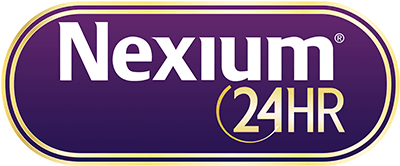Is Nexium24HR Used to Treat GERD?

In a word, no. But read on and we’ll explain.
Choosing the best medication to treat your symptoms of frequent heartburn can be challenging, especially when you see similar active ingredients in over the counter (OTC) and prescription strength medications. Nexium 24HR is here to help you treat your symptoms of frequent heartburn, and to help you understand the difference between frequent heartburn symptoms and gastro-esophageal reflux disease (GERD).
What Is Frequent Heartburn?
Nexium 24HR is indicated by the FDA for the treatment of frequent heartburn, that is, heartburn that occurs two or more days a week in adults (ages 18 and up). The feeling of heartburn is caused by digestive acid from your stomach moving up into your esophagus1, the tube that moves chewed food from your throat to your stomach.
At the bottom of your esophagus at the entrance to your stomach, a circular muscle called the lower esophageal sphincter keeps the contents of your stomach separate from your esophagus. It stays closed but opens to let food pass from your esophagus into your stomach. The sphincter then re-tightens.
However, if the muscle doesn’t fully close, some of the acid from your stomach may flow up, or reflux, into your esophagus. When this acid reflux occurs, it can cause discomfort that you might experience as heartburn.
The most common symptom of heartburn is a burning sensation in your chest, right behind your breastbone.2 Other symptoms of heartburn include:
- Discomfort that occurs after eating, while lying down, or while bending over
- Symptoms that disrupt your sleep, especially if you’ve eaten within two hours of going to bed
- A sour taste in your mouth while lying down
- A small amount of your stomach’s contents rising into the back of your throat, also known as regurgitation1
Heartburn symptoms are very common, and about 20 out of every 100 people living in a Western country regularly experience symptoms of heartburn or regurgitation.2
Your esophagus can become inflamed and painful if it’s frequently corroded by stomach acid.2
What is GERD?
GERD is a more serious version of acid reflux. GERD is diagnosed in patients who frequently experience severe heartburn symptoms and other complications. It is unclear as to why this happens, but people who have GERD might have a loose esophageal sphincter that doesn’t adequately seal the esophagus off from the stomach. GERD can also cause a large amount of stomach acid to leak into the esophagus, causing more severe symptoms.
In some patients, GERD is a result of a hiatal hernia. The diaphragm is the muscle that separates your chest from your abdomen. It has a small opening (called a hiatus) where the esophagus passes food into the stomach. A hiatal hernia is caused by the stomach pushing up into the hole. This upward bulge of the stomach prevents the diaphragm from helping fully close the esophageal sphincter to the stomach.2
Symptoms of GERD include:
- Heartburn
- Problems swallowing
- Feeling full even when you haven’t eaten
- A burning sensation in your throat
- Stomach noises
- A bad taste in your mouth
- Dry cough from stomach acid irritating your airways
- Asthma
- Toothaches from stomach acid affecting your teeth
- A hoarse or husky voice from an inflamed throat
- Nausea
- Vomiting2
- The feeling of a lump in your throat
- Laryngitis4
Patients can experience GERD over extended periods of time, and it can affect their quality of life and even lead to serious health complications if not treated properly.2
What Is Esomeprazole?
The active ingredient in a dose of Nexium 24HR is 20mg of esomeprazole. OTC esomeprazole is used to treat frequent heartburn (heartburn that occurs two or more days a week) in adults.3 Esomeprazole is a proton pump inhibitor (PPI) that works by turning off the pumps in your stomach that produce acid. Prescription esomeprazole is used to treat symptoms of GERD, but OTC medications containing esomeprazole, like Nexium 24HR, are only indicated to treat symptoms of frequent heartburn. Therefore, Nexium 24HR is not used to treat GERD.
How Long Does It Take Nexium 24HR to Work?
Nexium 24HR will start working on day one but might take up to four days before you start feeling the full effects of Nexium 24HR. Since Nexium 24HR stops acid production at the source, one pill a day gives you 24 hours of protection. Nexium 24HR should be taken every morning before eating and with a glass of water for 14 consecutive days.
Nexium 24HR is not for long-term use, so unless directed by your healthcare provider, you should not take more than one pill a day for more than 14 consecutive days and not repeat a 14-day course of treatment within four months. After taking a full course of Nexium 24HR, contact your doctor if your symptoms persist, or get worse or if you need to take more than one course of treatment every four months.
To learn more about what causes heartburn and what heartburn feels like, check out other articles on the Nexium 24HR website.
- Heartburn or heart attack: When to worry. Mayo Clinic. https://www.mayoclinic.org/diseases-conditions/heartburn/in-depth/heartburn-gerd/art-20046483. Accessed on 7/8/2021. Referenced text indicated in source PDF.
- Heartburn and GERD: Overview. InformedHealth.org and NCBI Bookshelf. https://www.ncbi.nlm.nih.gov/books/NBK279254/. Accessed on 7/8/2021. Referenced text indicated in source PDF.
- Esomeprazole. MedlinePlus Drug Information. https://medlineplus.gov/druginfo/meds/a699054.html. Accessed on 6/21/2021. Referenced text indicated in source PDF.
- Gastroesophageal reflux disease (GERD) - Symptoms and causes. Mayo Clinic. https://www.mayoclinic.org/diseases-conditions/gerd/symptoms-causes/syc-20361940. Accessed on 7/8/2021. Referenced text indicated in source PDF.
